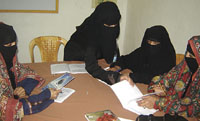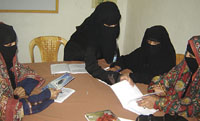
Yemeni women and illiteracy: Fact, fate and the fight [Archives:2006/996/Reportage]
November 6 2006
 |
[email protected]
“It is never too late to be who you might have been.” George Eliot.
The power of education has been recognized in the 21st Century. Across Yemen, many women are starting to assess their lives realizing what lies behind reading and writing. Has the realization come too late?
Women in their twenties, and many well into their thirties and beyond, have decided its time to return to school. Many now study with their kids and younger brothers. These women realize the importance of Jimmy Carter's statement, “The only real failure is not to learn.”
Latifa Al-Aizi a 50 year old, mother of ten and grandmother to ten grandsons. She studies in an Illiteracy Eradication Center in Sana'a. She decided to study after all her children had finished their studies and had graduated from the University of Sana'a. “I realized I was the only illiterate in the family. I worked hard rearing my children to become solid members of society. Now it's my turn. Why am I illiterate? Is it my fate? -I don't think so.”
Mahdiah Al-Marani a 55-year-old mother wants to read and write like her neighbor who studied in another Illiteracy Eradication Center five years ago and has now memorized the whole Qur'an.
Nadia Al-Howati has a different story. Her four children study in private schools and constantly need help with their homework. “I feel shy and sorry when my kids ask me to explain any misunderstanding they have with their class work. They thought I was as educated as their friends' mothers.” Nadia, forced to opt out of school to get marry, now she wishes to start from the beginning and finish regardless of the difficulties she may face. She is doing this not only for her children, but also for herself.
There are women that regardless of their responsibilities towards home and children, find their husbands to be supportive going as far as wanting to teach them to read and write. “My husband”, says Latifa Al-Aizi, “always encouraged me to study, but I felt I was busy with my kids and their education. I thought it wasn't important to spend time learning how to read and write. Now I realize and feel sorry for those wasted years.”
Latifa is among those whose families have become supportive champions in their cause to become literate. Latifa says that the whole family appreciates who she is and has promised to help her. “My husband bought books and a small black board so I could practice what I learn in class. My daughters”, she adds, “spend an hour each day reviewing my homework. Then there is my grandson who's in the first grade who has installed himself as the professional teacher and his grandmother as the faithful student.”
Unfortunately, negative aspects of our society and the application of social rules close the door to education. The often repeated proverb that says “a woman has two choices in life: either a husband or a grave”, has effectively ingrained a negative mentality into the fabric of Yemeni life concerning education. Young girls do not have the support of their families; conditioned only to be wives and mothers -the only viable choice before death. How tradition is applied only victimizes the women who are the largest illiterate group in our country. We live in the 21st Century yet people continue to hold on to negative and meaningless ideas about women and education. Nadia blames her Father and brothers. “They forced me to marry while I was still in the fifth grade. I couldn't reject nor discuss the matter with them.”
The not so fortunate ones like Hajah Mahdiah, count themselves among the majority of Yemeni families. These families see returning to school as useless. Hajah Mahdiah's family says she is too old to learn; that her level of comprehension is low. “My sons are not keen on my studies. They believe that the best age for learning is in early childhood and often repeat the proverb -that learning on childhood is like the decorations on the rocks- especially if I couldn't memorize or understand something quickly enough.”
For 28-year old Bushra Nasir neither age nor levels of comprehension ever came into account when deciding she was not going to school. She is still the only uneducated girl in her neighborhood. Her father and brothers say it is shameful for girls to go to school, receive co-education; and mix with men. Even when studying in school does not automatically give you Co-Ed arrangements; most classes being single sexed. Bushra tried to convince her family of the importance of studying. They didn't give her the chance. “I begged them to let me study even at my age; that it was better than nothing. But they said it was too late to start and that it was not suitable for me to study with children or in illiteracy centers.” We wonder what then would be considered suitable?
At 40, Sadiah Raziag remembers her father did not allow her to go to school. She kept hoping that once she married her husband would allow her to study. Unfortunately, her husband was as cruel as her Father. “My husband said I could not balance between my duties at home and anything else that could happen outside my home. I lost the hope. But I swear my daughter will study and continue until she finishes; even if I have to stand against my husband.”
Twenty-eight year old Nawil was forced to leave school while she was in the 5th grade but never gave up for a minute. She secretly studies in an institute and tells her family she is learning handicraft skills. ” If one of my family members would find out I am studying, he might never allow me to leave the house.” Several times, Nawil has commented, her family has hit her because she has spoken of her dreams to finish school some day and become a famous journalist.
Confucius said, “If you think in terms of a year, plant seed; if in terms of ten years, plant trees; and if in terms of a hundred years, teach the people.” This is the belief of many educated people, who understand the importance of literacy, that compels them to volunteer to teach at these Illiteracy Centers pro bono, never looking for money or fame. They seek Allah's satisfaction.
Ramzia, a volunteer at a center, aims to decrease illiteracy among Yemeni women. “I believe if a person has the intention to learn or do something; that person will do it regardless of age, gender or what have you.” Samiah Al-Yemeni, owner of a center and volunteer teacher, focuses on one of the main reasons for illiteracy. “Illiteracy will never end as long as students can opt out of school. The problem of illiteracy might be limited by stopping this phenomenon.”
The questions remain: When will education for both men and women become mandatory in Yemen? When will the option to take your children out of school become illegal?
The women who enter these centers are serious in their resolve to learn to read and write; wanting to be something more in the future. “I observe students as they make efforts to study seeing the difficulties some suffer, yet they continue to attend classes especially the women between twenty and thirty”, Ramzia states. “I always tell my students the stories of those who came before them, coming to study at these centers and how they succeeded and became solid members in the community. Now some of these women hold high positions in society.” She adds, “I do this to motivate my students into never giving up.”
Statistics, however, are bleak. 80 percent of the international Muslim population is illiterate. Some estimate Yemen has about 7 million illiterates. However, the 2003 estimates of the World Factbook, while defining a person literate as a being 15 and over who can read and write in their native language, states Yemen has an overall literacy rate of 50.2 percent. Males they state have a literacy rate of 70 percent while women come only as far as 30 percent.
These numbers confirm records from the Illiteracy Eradication and Adult Teaching Organization that estimates an overall illiteracy rate of 49.3 percent. It mirrors the rate of females being at 67.9 percent illiterate and males at 34 percent. The organization goes one step further and states that the overall illiteracy rate in urban areas goes down to 38.3 percent while in rural areas it jumps to 57.6 percent. Within the productive workforce, literacy rates at 10.45 percent.
Regardless these numbers are staggering, considering Yemen's population currently at 21.45 million and growing annually at a rate of 3.46 percent. That women account for 70 percent of the total amount that is illiterate could mean female numbers go well into the ten million. That is too many illiterate women.
Yet there are efforts out there in society to help eradicate illiteracy. The program created by the Educational Channel called, “Let us learn” is one. It is methodology aims to use every scientific and behavioral form available. Their objective is to eradicate illiteracy in Yemen by direct television broadcasting.
——
[archive-e:996-v:14-y:2006-d:2006-11-06-p:report]


